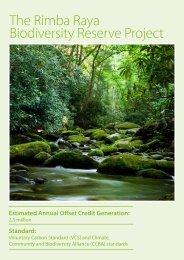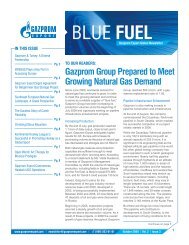October
October
October
Create successful ePaper yourself
Turn your PDF publications into a flip-book with our unique Google optimized e-Paper software.
<strong>October</strong> 2012 | Vol. 5 | Issue 3BLUE FUELprovide Europe with more time to select and fine-tune itscarbon abatement plans by 2050. Policy support should bereasonably even-handed across a range of low carbon energytechnologies (which include but are not limited to renewables)for providing additional “start-up” support for emergingtechnologies which promise a competitive cost of CO 2abatement in due course.EGaF is exploring the residential and the transportation sectorsin more detail with two additional studies. The residentialstudy was made public on 19 July, while publication of thetransportation study will soon follow. Both studies highlight thepotential cost savings to meet the 2050 CO 2emissions targetsthrough a higher reliance on natural gas technologies.In the residential sector adopting a more diverse technologymix that include gas fuelled heat pumps, gas-fired DistrictHeating and Combined Heat and Power (CHP) could lead tocost savings in the order of €100-120bn compared to a higherelectrification pathway by 2030. In the transportation sector, anincreased reliance on natural gas powered vehicles (particularlyan increased use of LNG as a bunkering and heavy truckingfuel) could also lead to significant savings (in the order of€60-70bn, to 2030) while remaining on track to meet the EUTransport White Paper’s 2050 GHG reduction targets.These two complementary approaches show how a lowercost,lower-risk, and low-carbon energy mix for Europe can beachieved based on cost-effective and technology neutral CO 2mitigation solutions, combining necessary actions on climatechange with secure and affordable access to energy.EGaF has met on several occasions with EU CommissionerOettinger and representatives of DG Energy to presentits results. It also met with other stakeholders of other gasorganizations such as Eurogas, IGU, Gas Naturally, or NGO’ssuch as ECF, Greenpeace, WWF. It has received very positivefeedbacks and gained some significant momentum in thedebate over the future of the energy mix in Europe.In terms of perspectives for natural gas in Europe, it is fair tosay that things have changed significantly over the last twoyears. The impact of Fukushima and the economic downturnhave shed a new light on the energy future of Europe. Leavingoptions open, relying on a balanced energy mix and ensuringthat we avoid unnecessary costs to the economy are now beingaddressed more prominently.Natural gas now has a much brighter future perspective,although a lot remains to be done, particularly with respectto ensuring that natural gas remains a competitive energysource. In the light of abundant due to the unconventionalgas revolution, increased diversity of supply and efficienttechnological solutions, we are confident in the tremendousopportunities of growth that natural gas offers in the short andlong term.At EGaF, we like to think that part of this effort is due to theextensive work done by our members. Yet, challenges remainand EGaF intends to continue to be part of the debate.To learn more, please visit http://europeangasforum.eu/Energy and LeadershipBy Eric Dam, president of the Energy Delta InstituteEnergy plays a crucial role in supporting our modern wayof life. In spite of significant progress in the efficiency of itsuse, energy consumption will continue to rise as incomelevels grow and increased access to energy is guaranteedto an ever growing population. In order to meet growingglobal energy demand, the energy sector has to work hardto overcome numerous challenges. Exploring the unknownarea’s for new gas, energy transition, CO 2reduction,market liberalization, and the need for new and differentinfrastructure services are but a few of the challenges thatlay ahead. It will be up to future executives and leaders ofthe energy industry to meet and resolve these issues. Thiswill require skills, knowledge and expertise in an ever morecomplex industry.To identify what skills and competences are needed tobecome a successful executive in the energy industry,the Energy Delta Institute (EDI) conducted a market surveyContinues on page 22www.gazpromexport.com | newsletter@gazpromexport.com | +7 (499) 503-61-61 | comm@gazpromexport.com 21ÝÊÑÏÎÐÒ
















